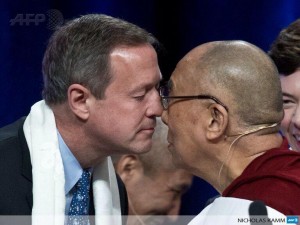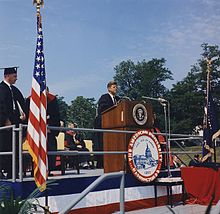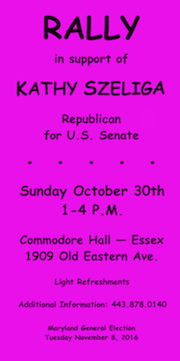
Gov. Martin O’Malley nuzzles noses with the Dalai Lama May 7 at Uni- versity of Maryland, College Park. (Photo/The governor’s FB page.)
POLITICIANS SHOULD HAVE TO BUY ‘PODIUM TIME’
TO SPEAK AT HIGH SCHOOL, COLLEGE GRADUATIONS
By David Maril
High school and college commencements represent significant milestones. Why, then, on such an important day for graduates and their families, are so many keynote speakers duds?
Too often colleges and high schools settle for tiresome hacks who are only interested in promoting themselves and pushing their personal agendas.
Whether good or bad, I can’t even remember who spoke at my graduation from Park School in Baltimore (at Brooklandville, near Pikesville). However in college, at Clark University, in Worcester, Mass., I do recall Kevin White, a former mayor of Boston, launching into a forgettable cheerleading session about politics.
It sticks out in my mind because the weather was hot and his rambling speech was so boring. At the time (1972), White was considered a promising liberal Democrat who might rise to national prominence. It never happened. One of his downfalls was probably too many speeches like the one I heard at Clark.
To me, the worst choice for a commencement speaker will always be a politician who is either in office or planning to run. These people jump at the chance to speak at such events because it’s an opportunity to promote themselves as caring individuals who are supporting education, positive values — and the next generation of voters.
When politicians address graduates, the focus subtly shifts into campaign mode and the talk is primarily about them and their so-called accomplishments.
SELF-CENTERED FREELOADERS LIVING OFF TAX DOLLARS
I can never understand why anyone would want a politician to speak at a commencement. Other than what it takes to get reelected for doing as little as possible, what type of worthwhile advice can self-centered freeloaders, living off our tax dollars, offer?
Just look at the political gridlock in Washington. Too many of today’s politicians are shifty hypocrites who lack the courage and conviction to find common ground and get things done.
If leaders of academic institutions insist on tormenting us with these political keynote speakers, why not charge them a hefty fee so they will actually be paying for their airtime? Instead of offering them speakers’ honoraria, why not make them pay for the privilege of addressing large graduation audiences?
While schools and colleges are struggling to maintain their programs through tough economic times, politicians are amassing huge campaign-treasury war-chests to saturate the TV and radio airwaves in their campaigns. Wouldn’t it be a positive move to divert some of that money earmarked for attack ads, into education?
Other than the bragging rights that you had a sitting governor speak at your graduation, what was the big deal about St. Mary’s College of Maryland selecting Gov. Martin O’Malley as its 2013 commencement speaker? (See Addendum below for a better St. Mary’s College speaker.)
MARTIN O’MALLEY: YOU CAN’T ESCAPE HIM
With the exception of people connected to the Orioles and Ravens, is there a more publicized figure in Maryland than the current governor?
In the midst of a 20-year campaign to be president, you can’t escape him. On Sunday mornings, he’s on network television trying to look presidential, sticking to talking points and not answering questions, typically on Face The Nation and Meet The Press.
On any other given day, it’s not surprising to see him rubbing noses with the Dalai Lama at the University of Maryland.
What words of wisdom could anyone expect from O’Malley at a graduation ceremony, that we have not already heard?
Mayor Stephanie Rawlings-Blake, speaking at University of Maryland University College, was an equally uninspired choice.
OK, it’s reasonable to make an exception to the anti-politician stance with President Barack Obama speaking at the Naval Academy. Here, it’s always a case of the office of the presidency more than politics. Whether it’s Calvin Coolidge, Harry Truman, Ronald Reagan or John F. Kennedy, an appearance by a president is special.

President John F. Kennedy delivers the com- mencement address at American University, June 10, 1963, remembered as one of Ken- nedy’s finest and most important speeches.
And sometimes the presidential addresses are newsmakers: For example, Kennedy’s commencement address at American University in Washington in 1963 is still cited as a major foreign policy speech.
Looking around the state, it’s difficult to improve on McDaniel College’s selection of husband-wife journalists Al Hunt and Judy Woodruff. These are two of the most respected and experienced reporters on the national scene.
CAL RIPKEN AND BILL COSBY
Baltimore author Judith Viorst at Goucher, Cal Ripken Jr. at University of Maryland, Bill Cosby at University of Baltimore, and author Kathleen Koch at Notre Dame are also pretty solid selections.
The keynote speaker does not have to be someone everyone agrees with. Different points of view should be tolerated in the academic world as long as the discussion remains civilized and people are treated with respect.
However this year’s graduation roster of speakers has not been without controversy.
Ben Carson, a world-renowned Johns Hopkins surgeon, withdrew as commencement speaker at the university’s medical school after strong public reaction against harsh comments he made in opposition to gay marriage.
Robert Zoellick, former World Bank president, decided not to appear at Swarthmore College because of student protests against his support of the Iraq War. Sean P. O’Malley, head of the Roman Catholic Archdiocese of Boston, announced his boycott of the graduation ceremony at Boston College because Prime Minister Enda Kenny of Ireland, who supports narrow abortion rights legislation in his country, is speaking.
CELEBRITIES OFTEN FIRST CHOICES AS KEYNOTE SPEAKERS
On the lightweight side, celebrities are often the first choices as keynote speakers. Unfortunately, we tend to overlook relevant candidates from other walks of life.
No matter who speaks, it helps if it’s a person of vision and accomplishment who conveys the integrity and character to deliver a challenging message.
It’s not an easy job. Keynote speakers are expected to deliver inspirational wisdom with a philosophical look at the past and motivational advice for the future. It helps if their remarks are concise enough to avoid putting the audience of families and friends to sleep. Often, the messages are forgotten soon after they are delivered.
If it was up to me to pick a speaker, I’d insist the person be compensated for traveling expenses only and allow the institution to donate the fee to an agreed-upon charity. I’d want someone who has made a difference in peoples’ lives with something significant to say.
If I was overruled and had to pick a politician, I’d make the “public servant” pay a speakers’ fee equal to the cost of a campaign ad.
davidmaril@hermanmaril.com
Addendum: AN HISTORIAN AND A BUBBLE-BLOWER
![Beschloss,MichaelR.--MichaelR.Beschloss-St.Mary'sCollege(2002)[cropped]](http://voiceofbaltimore.org/wp-content/uploads/2013/05/BeschlossMichaelR.-MichaelR.Beschloss-St.MarysCollege2002cropped.jpg)
Historian Michael R. Beschloss’s 2002 commencement address at St. Mary’s College of Md. was short and sweet.
Unlike Martin O’Malley’s speech a decade later, Beschloss’s remarks were short and sweet, focusing on the need for graduation speakers to graciously accept their complimentary degrees — St. Mary’s awarded him an honorary doctorate — energize the graduates to “go out in the world and accomplish something”; and get off the stage quickly.
In so doing he recalled his own graduation (from Williams College in Massachusetts, where he studied under the esteemed historian and political scientist James MacGregor Burns)… a commencement ceremony at which the actor Robert Redford was an honoree but was not asked to give a speech. Redford did however sit on the dais, adjacent to the podium.
Beschloss told the St. Mary’s graduates he could not remember who gave the keynote address at the commencement nor what the subject was, only that it was supremely long-winded, pompous and boring, and that about an hour into the address the speaker paused for a moment, then said, “And now for the second half of my speech.”
At which point the audience collectively groaned. And Robert Redford pulled out a wad of bubblegum, stuffed it into his mouth and proceeded to blow (and pop) bubbles for the remainder of the speech.
Beschloss then told the students, “If there’s any life lesson I can offer to the St. Mary’s Class of 2002, it is this: Try to discover what you really love doing most of all and see if you can make it your profession.”
After which he politely thanked his audience and sat down. His commencement address totaled less than 15 minutes. —Ed.
CHECK OUT LAST WEEK’S “INSIDE PITCH” COLUMN: click here






May 19th, 2013 - 7:30 AM
[…] Voice of Baltimore […]
May 21st, 2013 - 11:58 PM
Ripken invoking Scientology in his address was in poor taste.
May 26th, 2013 - 2:05 AM
[…] davidmaril@hermanmaril.com CHECK OUT LAST WEEK’S “INSIDE PITCH” COLUMN: click here Filed under: Top Stories Comment […]